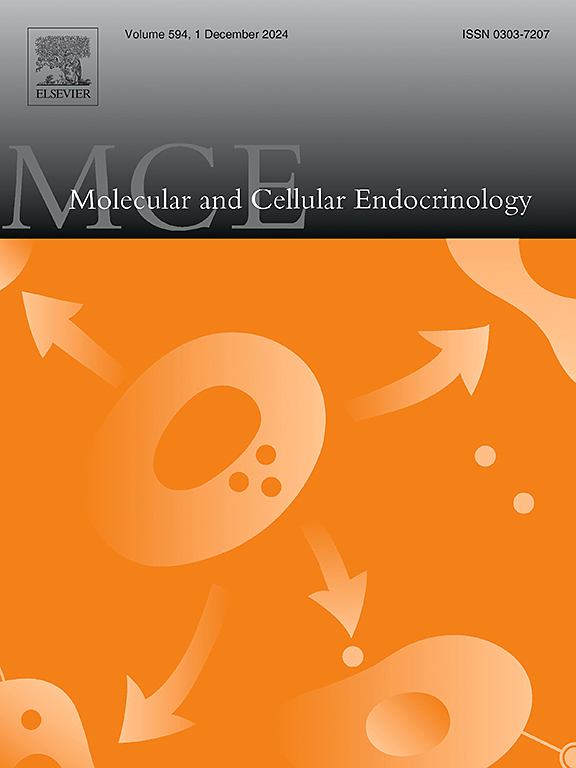Ghrelin treatment and exercise improve sperm quality in rats fed an obesogenic diet:A potential link to LEAP2
IF 3.6
3区 医学
Q2 CELL BIOLOGY
引用次数: 0
Abstract
This study aimed to evaluate whether ghrelin, with or without exercise, can reverse the alterations caused by an obesogenic diet on sperm quality, metabolism, and endocrine profile with emphasis on LEAP2 levels.
Fifty five male Wistar rats were randomly assigned, from weaning to postnatal day (pnd) 103, to five groups (n = 11/group): CD (standard chow + water); ObD (chow enriched with 30 % pork fat + water with 5 % fructose); ObD + ghrelin (obesogenic diet + 6 nmol/animal/day of ghrelin from pnd 85); ObD + Exc (obesogenic diet + standardized exercise in a running wheel, 15 min/day, 3 days/week); and ObD + ghrelin + Exc.
Body weight gain was accelerated in ObD, but ghrelin and/or Exc slowed it down. At pnd 103, all treatment groups were significantly lighter than the ObD group. Metabolic parameters were impaired in ObD animals, with exercise markedly improving them, reducing cholesterol and triglyceride levels close to control values, while ghrelin exerted a modest effect, partially reducing triglycerides and the triglyceride/HDL index but leaving values still dysregulated. Sperm concentration and motility were significantly reduced in the ObD vs. CD; ghrelin and/or Exc completely reversed these detrimental effects. Plasma LEAP2 was significantly higher in the animals receiving the obesogenic diet, and, LEAP2 correlated inversely with sperm concentration, explaining 22 % of its variation. No synergistic effects were found between ghrelin and Exc.
We demonstrated for the first time the potential of ghrelin to reverse sperm quality alterations secondary to obesity. Furthermore, ghrelin exhibited weight gain-slowing effects comparable to those of Exc. We also found an association between LEAP2 and sperm concentration, which warrants further investigation.
促生长素治疗和运动改善了喂食致肥饮食的大鼠的精子质量:与LEAP2的潜在联系
本研究旨在评估在运动或不运动的情况下,生长素是否可以逆转肥胖饮食对精子质量、代谢和内分泌(重点是LEAP2水平)造成的改变。取55只雄性Wistar大鼠,从断奶至产后第103天(pnd),随机分为5组(n = 11/组):CD(标准饲料+水);ObD(添加30%猪油+ 5%果糖的水的饲料);ObD +胃饥饿素(致肥性饮食+ 6 nmol/只/天的pnd 85胃饥饿素);ObD + Exc(致肥性饮食+标准化跑步轮运动,每天15分钟,每周3天);ObD组体重增加加快,但ghrelin和/或Exc减慢体重增加。在pnd 103时,所有治疗组均明显轻于ObD组。ObD动物的代谢参数受损,运动显著改善代谢参数,使胆固醇和甘油三酯水平降至接近控制值,而胃饥饿素发挥适度作用,部分降低甘油三酯和甘油三酯/HDL指数,但仍使数值失调。与CD相比,ObD组精子浓度和活力显著降低;ghrelin和/或Exc完全逆转了这些有害影响。在接受致肥性饮食的动物中,血浆LEAP2明显更高,并且,LEAP2与精子浓度呈负相关,解释了22%的变异。我们首次证明了ghrelin逆转肥胖引起的精子质量改变的潜力。此外,ghrelin表现出与Exc相当的体重增加减缓作用。我们还发现LEAP2与精子浓度之间存在关联,这值得进一步研究。
本文章由计算机程序翻译,如有差异,请以英文原文为准。
求助全文
约1分钟内获得全文
求助全文
来源期刊

Molecular and Cellular Endocrinology
医学-内分泌学与代谢
CiteScore
9.00
自引率
2.40%
发文量
174
审稿时长
42 days
期刊介绍:
Molecular and Cellular Endocrinology was established in 1974 to meet the demand for integrated publication on all aspects related to the genetic and biochemical effects, synthesis and secretions of extracellular signals (hormones, neurotransmitters, etc.) and to the understanding of cellular regulatory mechanisms involved in hormonal control.
 求助内容:
求助内容: 应助结果提醒方式:
应助结果提醒方式:


